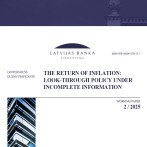Last year ended with record low inflation in a growing economy
In December, the annual inflation remained negative (minus 0.4%) and it was mostly determined by a drop in energy prices. Even though the prices of fuel as well as some foodstuffs rose in December, the rises were compensated by drops in the prices of thermal energy, wearing apparel and footwear and thus the price level did not change month-on-month.
The thermal energy prices dropped in those cities where heating is based on natural gas, because the price of natural gas dropped for business consumers. In some cities (Jelgava, Ventspils, Liepāja), also the new tariff plans of lower prices came into force. Since warmer weather leads to lower consumption of thermal energy, the December heating bills will be substantially lower than for December 2012. The lower heating bills as well as the desire to spend small accruals of lats in January could stimulate consumption of other goods and services, without having a substantial impact on their prices, as it is a one-off factor.
The global food prices in December remained rather stable and the small rise was created by the increased consumption of products of animal origin (dairy and meat) in China. In these groups of consumer goods, prices did not rise substantially in Latvia in December. The global oil prices fluctuated in a rather small range, yet they were slightly higher than in November and that is why the average fuel price in Latvia increased by 1.1%.
The average annual inflation in 2013 reached a record in a growing economy (0.0%), which, to a great extent, is the result of supply factors.
The annual inflation level in the coming months is likely to return to the positive range. The impact of inflation-reducing supply side factors that were at work in 2013, (drop in oil prices, transformation of the thermal energy production process etc.) will diminish gradually and in 2014 inflation will be influenced by a small increase in taxes on some goods (auto-gas and tobacco). Gradually, over a longer period of time, economic growth will also impact price development.
At the beginning of 2014, the expected drop in thermal energy prices did not take place in Daugavpils, whereas AS "Rīgas ūdens" announced its wish to raise the water supply tariffs that have not been changed since 2007 and cannot cover the costs of infrastructure renovations. In mid-January, the price of thermal energy will rise slightly in Valmiera. These factors will not cause a rapid upward leap in inflation, yet their influence differs from the dropping trend in regulated prices and energy prices that was the calling card of 2013.
The data of the price watching initiative for December and the first week of January indicate that in the last month of 2013 entrepreneurs did not rush to adapt the prices convenient for settlement where they were favourable in lats. Some service providers (e.g., in catering) had adjusted their prices for convenient settlement in euro as early as October and retained them in January. In areas where cash settlements are usually used and the convenience of settlement is important in the currency at hand (e.g., public transportation, hairdresser salons), the prices changed in some places in January, but it happened in both directions. The changeover in Latvia to a currency whose unit price is less than one lats, is an additional factor why the price level remains as close as possible to what it was in lats.
Textual error
«… …»






